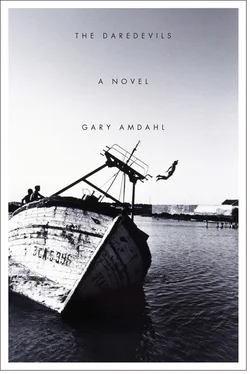“You seem to know a lot about the Willimantic mill.”
Vera looked at Charles when she answered him. It was the first time the dreamy look drifted away from her eyes.
“I do.”
“You have never talked about the Muscatine mill this way.”
“My job in Muscatine was much simpler. There were no machines involved. I was younger and if I worked there longer, it doesn’t seem that way now. Too much happened in Willimantic.”
“From buttons to thread.”
“American Button to American Thread.”
“Are you really from Muscatine? Is your name really Vera?”
Vera looked away and sighed. After a while, back in character, she continued her story.
“Because our drums were necessarily near the loading docks, we were privy to tantalizing portions of the conversations of the men who came and went there: the suggestive small talk and boasting and whispered rumors, the thick accents and humorous imitations, bits of news and gossip, jokes and the tag ends of strange lines of dialogue, oratory and performance of anecdotes to pass the time — and of course, observation, analysis, commentary, complaint, and passionately voiced frustration, which became, with what seemed like the passage of the years of our young womanhood, slow-boiling anger and isolated bursts of terrifying outrage. It was, in the absence of real family and friends, with these men that we learned to speak — first to ourselves, but after not too long, publicly and socially as well. Rosemary became a favorite of some of these men. She was pretty, I was not.”
“Don’t be absurd! You are fantastically beautiful!”
“You are sweet, but it’s not true.”
“Oh, Vera. ”
“They sought her out and kidded her while the drums turned and we pushed the dirty lumpy cotton along the feeding tray. She kidded them back, telling them of her merciful, nutrient-rich urine and the deep little people who prayed for it. The men found her inventions startlingly witty in one so young. It’s not too much to say they found her fascinating, which attention in turn encouraged her to act more audaciously, to broaden the reach of her narratives, and to deepen their meaning. By the time we were fourteen, in the year 1910, she was the center of a devoted circle. The men (boys, really, not much older than she) would appear in the several proscenia of the open loading dock doors, lit and backdropped according to the weather, sometimes silhouettes against the bright sunlight, sometimes colorful heroes striding out of the ravages of a storm, conduct their business, tease her a little bit from a distance, making big obvious gestures and shouting, then drift nearer and nearer, refining remark and gesture as they came until at last they were speaking into each other’s ears and there was fondling and wrestling and kissing and all our drum-mothers would scream abuse — early days, or, later, blow their whistle. It’s not hard nowadays to imagine the extent to which the sexual play went, but we couldn’t believe what was happening. Then, one day the next year, they stopped coming. We did not know why, but suspected that the drum-mothers had said something to someone, and someone perhaps had supplied them with the goddamned whistles, and now had taken even harsher steps to restrict the flow of communication into and out of the mill. Rosemary fell into a deep depression — I did not — and kept climbing up and tumbling down the sides of it. Her old nervous unease and disorder — the tics only she noticed, the fluttering feeling and the feeling that something other than blood was coursing flammably through her veins, and her heart, racing for no reason until she felt ready to faint, then hovering on the edge of unconsciousness until it passed — began to take hold of her again. Her head ached ceaselessly, her whole body ached and trembled, and she fell into nearly incoherent rages over nothing. It was either that or weep, almost undetectably but uncontrollably, while staying physically steady, pushing and spreading the cotton as the drums screeched in their eternal revolutions. She became fixated on the idea that there were little girls inside her drum, dead little girls playing games and singing, girls who could be our dearest friends but for the fact that they were trapped in the drum and forever tumbling. Noises would suddenly sharpen and penetrate her head, then fade out again, there were dark curtains around the familiar shapes of her station. She could make out distinct and interesting conversations inside the drum and outside it simultaneously. She might hear bells ringing, horses nickering and snorting, greasy smoking engines thudding away, then suddenly clear human speech.”
“I think it was you who imagined these things.”
“It wasn’t me, you dumb bunny.”
“Why do I think it was?”
“If she looked up and saw her mother’s mouth moving, she would sigh and stop listening; if a man’s mouth and bushy moustache across the room were moving, she would listen as long as she could. On the worst days the noises would join and become unbearable, but then, as if under the control of a just and surprisingly merciful god, cease utterly. She might look up and see her mother’s mouth working some terrible curse — she knew the patterns of lips and tongue and jaw by now — see that she was sobbing, but hear nothing. In that silence, when she knew perfectly well that something inside her had broken — or perhaps only relaxed? — she could hear the little girls, our friends, inside the slowly turning drum singing whispery mournful songs, simple little dirges in time with the drum’s reemergent banging and creaking. Dazed by this silence and the warmth of the sad songs, she would slip to her knees and, sometimes, urinate. One day she did fully and completely faint. She was having trouble hearing anything at all — the sounds of the mill were muffled and she could only see the drum-mother’s lips moving as she hectored and judged almost good-naturedly, and she made a motion as if to squat and pee. The drum-mother reached out with her habitual gesture almost of comfort but of restraint too, but Rosemary went unsteadily down. She began to urinate, then blacked out and went over backward. The drum-mother panicked. Fallen workers were to be left to their own devices and the assistance of floor managers, so she stepped over Rosemary, hurriedly pushed some cotton along the tray, then dashed to the back to the carder. Rosemary awoke a second or two later, having no idea what had happened or where she was. When it came to her — when she realized she was not in a strange white room but in the mill — she tried to get to her feet. Her mother reached out now without even looking at her and caught a hank of her long dark hair. She tipped over again but her mother wouldn’t let go this time, bending awkwardly but keeping her fear-filled eyes and one hand on her work. Rosemary crawled toward her, grabbed her ankle, and bit hard into her calf. Her mother yelped inaudibly under the noise of the machines and let go of her hair. Rosemary stayed low, slapping and banging the filthy floor as she made her getaway. One man laughed at her, again inaudibly, a grotesque grimace of pain, it looked like, and another shook his leg at her like he would a dog. The kick caught her a glancing blow, altering her direction and ultimately bringing her to her feet. The sound of the mill and its workers was now deafening but she could hear every note of it. She looked over her shoulder at her drum-mother, who stared back at her in panic and horror, and at me, wide-eyed, frightened — then bolted. I swallowed hard and followed her. She ran as fast as she could up the aisle into the heart of the mill, shouting, ‘STRIKE! STRIKE! STRIKE!’ I suppose I hollered the same or similar. Our fellow workers did pause in their movements, some for only a second or two, some for longer, and confusion began to mount. Leaping up the stairs to the second floor, we struggled — still dizzy as well as being ordinarily weak from the poor food we ate — with the weights and pulleys of the big iron door that led to the looms, pulled it open just enough to squeeze through, then lost our way in terrified inner darkness for a crucial moment. The door caught us as it swung heavily back into place. We screamed and fought the door and slipped through: the looms clattered and hummed. It was a noise on a higher register than the noise below, but more penetrating. Rosemary took a breath, started shouting ‘STRIKE! STRIKE! STRIKE!’ again, and dashed into the center of the room. It was exactly at that point that one of the mill’s famous lead-tipped shuttles shot from its loom. It was ‘a convergence of the twain’ worthy of Hardy. The shuttle traveled straight as an arrow, then, just as it began to lose momentum and descend, struck Rosemary in the temple. It was like the hand of God. That she should faint, then revive and race to a distant point only to intercept a missile streaking toward the very spot where she would be — and not simply be but be in an act of outright rebellion — seemed incontrovertibly theological in its parabolic progression. Because the danger posed by these powerfully ejected and effectively rifled shuttles, the room was laid out so that no one who was standing where he or she was supposed to be standing would be hurt when one of them fired itself out of a loom; the obvious corollary revolved around the ancient belief that if you weren’t where you were supposed to be, even for an instant! — you deserved what was coming to you. And it would always come to you. And because company policy was company policy no matter what floor you worked on, she was left in a heap on the floor. What had been coming for her for millennia had arrived. She was nervously glanced at over shoulders and under arms, and there was a great deal of surreptitious talk, but she remained where she was and as she was. Her long black skirt (in which was sown the flat little package of family documentation) was spread out around her and hid most of her body so that from a certain angle she looked like she’d fallen in a hole filled with black water, with only her head and arms above water, weakly hanging on to the edge.”
Читать дальше












